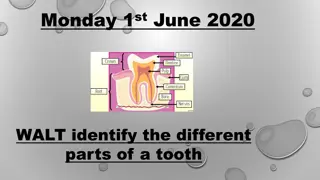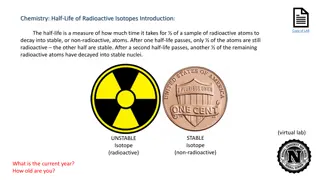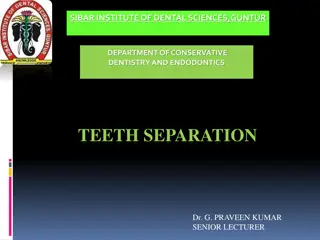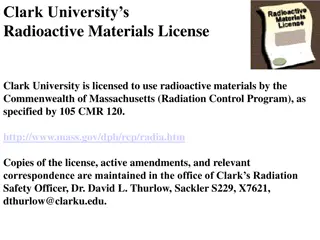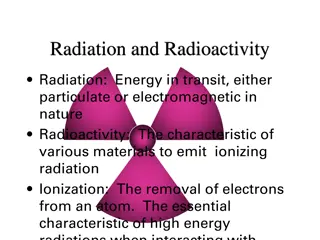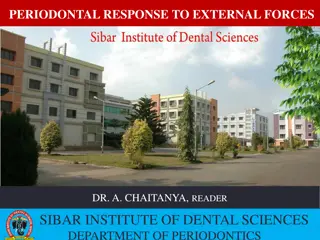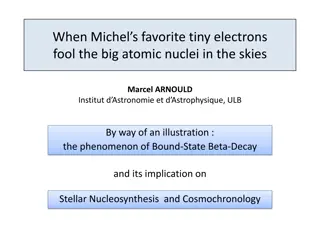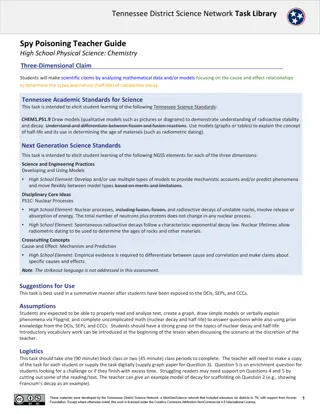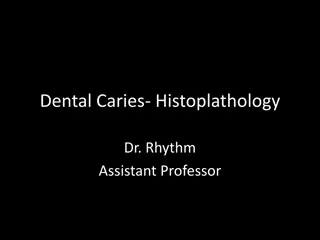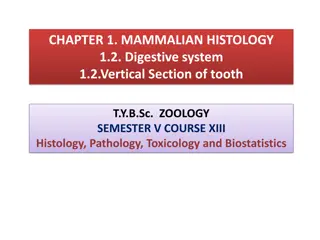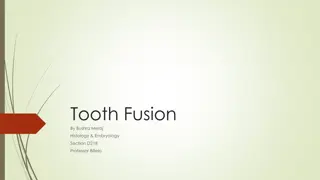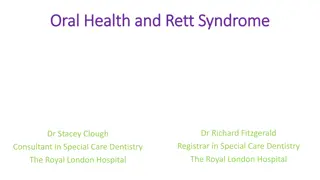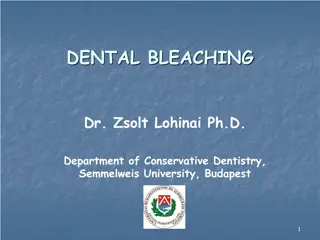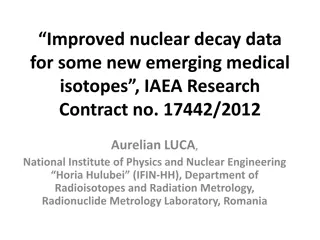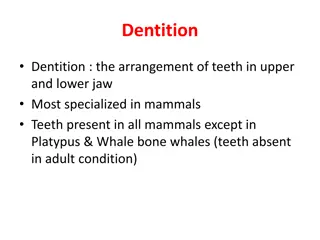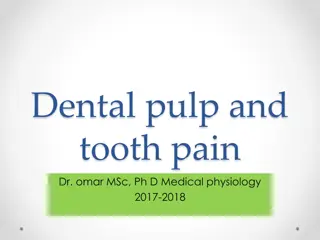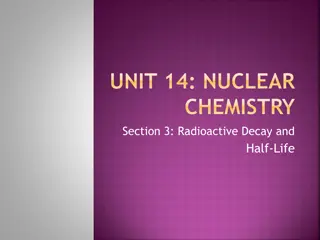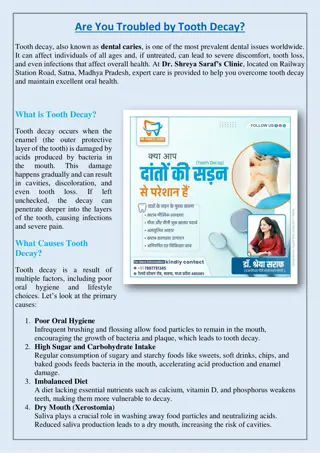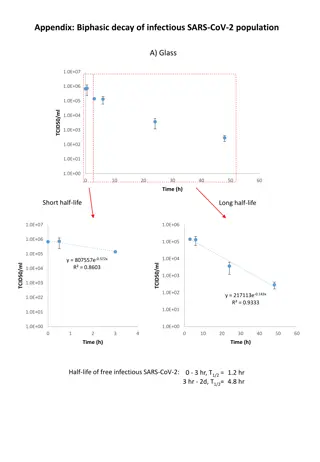Understanding Radioactive Decay and Nuclear Radiation
Radioactive decay is the process in which unstable atomic nuclei emit charged particles and energy, transforming into different elements. This process involves the emission of alpha particles, beta particles, and gamma rays. Alpha particles consist of two protons and two neutrons, beta particles are
4 views • 31 slides
DEVELOPMENTAL STAGES
The developmental history of a tooth is segmented into distinct stages, namely the bud, cap, and bell stages. Each stage represents critical morphological changes in tooth development, from the initial formation of tooth buds to the differentiation of enamel organs and dental papilla. Understanding
6 views • 33 slides
Emergency Dentist Donvale
When a tooth-ache develops, there are very few things that will settle it. Over the counter analgesic medications can dull the pain for a short period of time but it won\u2019t alleviate the pain completely nor will it solve the underlying problems. When a tooth pulp\/ nerve becomes inflamed due to
2 views • 7 slides
Understanding Exponential Decay in Ibuprofen Dosage
Explore the concept of exponential decay using an example of ibuprofen dosage elimination from the bloodstream. Learn how to calculate the remaining dosage at different time intervals based on the decay rate. Discover the relation between the initial dosage, elimination rate, and time passed.
2 views • 22 slides
Dental Developmental Stages: Bud, Cap, and Bell Stages Explained
The developmental history of a tooth is intriguingly divided into distinct morphologic stages - the bud, cap, and bell stages. Each stage represents a crucial phase in tooth development, from the initial formation of tooth buds to the intricate differentiation of enamel organs and dental papilla. Un
1 views • 40 slides
Understanding Forgetting: Theories and Influence on Memory Recall
Forgetting is a complex phenomenon influenced by theories such as Decay Theory, Interference Theory, and Motivated Forgetting. The Ebbinghaus forgetting curve highlights how memories fade over time. Decay Theory suggests memories decay over time, while Interference Theory explains how old and new me
0 views • 25 slides
Understanding the Different Parts of a Tooth
Explore the structure of a tooth by learning about its various parts such as enamel, dentine, pulp, and more. Discover the difference between the crown and root, and engage in interactive activities like labeling diagrams and creating models to enhance your understanding. Watch a video for a detaile
0 views • 7 slides
Understanding the Role of Alveolar Process in Dental Development
The alveolar process in the upper and lower jaw plays a vital role in housing, supporting, and protecting teeth. It anchors tooth roots, facilitates tooth movement for proper occlusion, absorbs and distributes occlusal forces, supplies vessels to the periodontal ligament, and aids in tooth eruption.
1 views • 28 slides
Exploring Radioactive Decay: A Half-Life Lab Simulation
Explore the concept of radioactive decay through a virtual lab simulation involving strontium-90 (Sr-90) and yttrium-90 (Y-90) isotopes. Witness the decay process over multiple half-lives as unstable atoms transform into stable nuclei. Dive into the intricacies of half-life measurements and the vast
0 views • 10 slides
Tooth Separation in Conservative Dentistry and Endodontics: Methods and Importance
Tooth separation is essential in restorative procedures to enhance convenience, achieve proper contacts and contours, improve operative treatment outcomes, and maintain oral health. This process involves slightly moving teeth apart or closer, or changing their spatial position. Different methods suc
1 views • 28 slides
Understanding Radioactivity: A Comprehensive Overview
Radioactivity is the spontaneous decay of unstable atomic nuclei, emitting alpha, beta, or gamma rays. This phenomenon is regulated by Massachusetts laws, with institutions like Clark University licensed for responsible use. Alpha decay involves emission of helium nuclei, while beta decay releases e
0 views • 39 slides
Structure and Functions of the Alveolar Process in Jaw Anatomy
The alveolar process in the upper and lower jaw is responsible for housing the roots of teeth, supporting tooth eruption, providing attachment for facial muscles, and aiding in mastication. During fetal development, the alveolar process forms and separates tooth germs, leading to the differentiation
3 views • 26 slides
Understanding Veneers and Laminates in Dentistry
Patients are increasingly seeking aesthetic treatments for anterior teeth, leading to the popularity of veneers and laminates. Veneers are tooth-colored layers applied to restore defects and discoloration, offering a less invasive and durable alternative to full crowns. The process involves applying
4 views • 55 slides
Understanding Radiation and Radioactivity in Science
Radiation is energy in transit, while radioactivity is the emission of ionizing radiation by materials. This process involves ionization, which removes electrons from atoms, leading to various nuclear decay processes such as alpha decay, beta decay, gamma-ray emission, positron decay, electron captu
0 views • 80 slides
Understanding the Role of Alveolar Process in Dental Support
The alveolar process in the upper and lower jaw plays a crucial role in supporting teeth, anchoring them to the alveoli with Sharpey's fibers. It helps in tooth movement for proper occlusion, absorbs and distributes occlusal forces, supplies vessels to the periodontal ligament, and protects both pri
2 views • 42 slides
Periodontal Response to External Forces in Periodontics
Adaptive capacity of the periodontium in response to occlusal forces is variable, influenced by factors like magnitude, direction, duration, and frequency. Trauma from occlusion occurs when occlusal forces exceed tissue's adaptive capacity, leading to tissue injury. It is classified into acute and c
0 views • 40 slides
Best Wisdom tooth surgery in Orchard
If you\u2019re looking for Wisdom tooth surgery in Orchard, contact Singapore Dental Implant Centre. They offer comprehensive services from all fields of dentistry. From dental implants and wisdom tooth surgery to root canal treatments and dental cro
0 views • 6 slides
Exploring Nuclear Equations and Beta Decay in Physics
Understanding the development of scientific theories like beta decay and nuclear equations through the work of Enrico Fermi and Chien-Shiung Wu. Discover the collaborative nature of scientific progress, where experiments validate theories and correct errors. Scientists worldwide, including George Ga
0 views • 7 slides
Tips for Packing a Healthy Lunch Box for Cancer Prevention
Providing a nutritious lunch box for school-aged children is essential for establishing good eating habits, improving concentration and behavior, aiding growth and development, preventing tooth decay, achieving their 5-a-day, meeting energy requirements, and reducing the risk of developing obesity.
0 views • 13 slides
Reflections of Decay: Edgar Allan Poe's Dark Journey
The content delves into the exploration of decay within the soul of a person and how it might manifest in their personality, clothing, lodging, and outer appearance. Through a series of thought-provoking questions, literary excerpts, and historical insights, the essence of decay and its potential ma
0 views • 11 slides
Tips for Healthy Teeth and Mouth
Regular oral hygiene practices are essential for maintaining healthy teeth and gums. Proper brushing after meals, regular flossing, and a balanced diet can help prevent tooth decay caused by plaque buildup and bacterial growth. Understanding the parts of a tooth and the importance of good oral healt
0 views • 14 slides
Understanding Nuclear Decays and Reactions in Stellar Astrophysics
Nuclear decays and reactions, driven by weak interactions, are vital in stellar astrophysics. Various processes like bound-state beta-decay impact nucleosynthesis and cosmochronology. Specific processes in stars involve capture reactions, electron capture, and neutrino-nucleus interactions. Stellar
0 views • 22 slides
Quality Education for a Healthier Scotland - Smile4life Initiatives and Oral Health Awareness
Explore Smile4life's programs focused on promoting oral health across Scotland. Learn about giving health advice, understanding the importance of oral health, and combating tooth decay through education. Discover key messages on diet, hidden sugars, and tooth decay prevention. Dive into the findings
0 views • 30 slides
Investigating Agent Z's Poisoning: A Case of Radioactive Decay
Agent Z, a double spy, was poisoned with Polonium-210, a heavy, radioactive element. This task challenges students to analyze the cause of his death using concepts of nuclear decay and half-life modeling based on provided data and models. The scenario involves understanding the effects of radioactiv
0 views • 14 slides
Understanding Dental Caries: Causes and Prevention
Dental caries, also known as tooth decay, is a common microbial disease affecting teeth, characterized by demineralization and destruction of tooth tissue. This comprehensive guide explores the causes, progression, and prevention strategies of dental caries, including demineralization and reminerali
0 views • 33 slides
Mammalian Tooth Structure: Vertical Section Overview
Mammalian teeth consist of hard tissues (enamel, dentine, cementum) and soft tissue (tooth pulp). The enamel is the hardest, dentine surrounds the pulp cavity, and cementum covers the dentine and connects to the alveolar bone. Tooth pulp provides support, nourishment, and defense mechanisms. Support
1 views • 7 slides
Understanding Tooth Fusion in Dentistry
Tooth fusion is the merging of two tooth germs into a single large crown, which can be complete or incomplete depending on the developmental stage. It can affect primary dentition, mostly incisors and canines. Differentiating fusion from gemination involves examining the pulp chambers. Causes may in
0 views • 9 slides
Understanding Oral Health and Tooth Care for Children
Explore the importance of oral health in children, covering topics such as healthy teeth and gums, baby teeth and adult teeth development, new teeth eruption, tooth decay prevention, and the benefits of sugar-free foods. Learn how to maintain proper oral hygiene to ensure a lifetime of healthy smile
0 views • 20 slides
Importance of Oral Hygiene and Preventing Tooth Decay in Children
Understanding the significance of oral hygiene and preventing tooth decay in children is crucial for their overall health. By learning about dental plaque, causes of tooth decay, effective teeth brushing techniques, and the impact of sugary foods and drinks, children can take steps to maintain good
0 views • 21 slides
Understanding Tooth Discolorations and Treatment Options
Explore the causes of tooth discolorations, including both exogenous and endogenous factors, along with the effects of age and various dental conditions. Learn about the importance of tooth shade genuineness and the demand for teeth whitening for improved aesthetics and self-confidence. Discover the
0 views • 25 slides
Analysis of Tune Variation and Decay in Large Hadron Collider
This analysis focuses on the tune variation and decay of the bare machine tune in the Large Hadron Collider. It covers the evolution of the bare tune, analysis of the tune decay after injection, fitting of decay constants, and data extraction from 2015. The study includes insights into beam commissi
0 views • 16 slides
Understanding Compound Growth and Decay Through Examples
Compound growth and decay, specifically compound interest, involve calculating interest on a changing total amount over time. This concept is illustrated through various examples and equations, showcasing how investments or values increase or decrease with each period. Learn how to solve problems re
0 views • 9 slides
Understanding Radioactive Decay and Isotopes in Chemistry
Explore the fascinating world of radioactive decay, isotopes, and nuclear transformations in this educational resource. From reviewing atomic numbers to illustrating alpha and beta decay processes, discover the fundamental principles behind these phenomena with detailed explanations and visuals. Del
0 views • 17 slides
Enhanced Nuclear Decay Data for Medical Isotopes Research
Improved nuclear decay data for emerging medical isotopes was evaluated as part of an IAEA research contract. The process involved reviewing previous evaluations, gathering experimental data, compiling decay data sets, and disseminating results. Challenges at IFIN-HH/LMR included limited funding and
0 views • 32 slides
Mammalian Dentition and Tooth Structure
Dentition refers to the arrangement of teeth in the upper and lower jaw of mammals. Most mammals have specialized teeth, with some exceptions like the Platypus and Baleen whales. The structure of a mammalian tooth includes the crown, root, and neck, made up of dentine, enamel, and cement. Tooth deve
0 views • 13 slides
Understanding Dental Caries Development and Factors Affecting Tooth Decay
Dental caries, commonly known as tooth decay, is a result of localized chemical dissolution of the tooth surface due to metabolic events in the biofilm. Factors like host susceptibility, plaque formation, diet, and time play a crucial role in the carious process. Tooth morphology, position of teeth,
0 views • 23 slides
Understanding Dental Pulp and Tooth Pain: A Comprehensive Overview
Dental pulp, a soft connective tissue, plays a crucial role in tooth health. It consists of various cells and components like collagen, proteins, and growth factors. The innervation of dental pulp by sensory fibers influences pain perception, with different types of nerve fibers implicated in differ
0 views • 23 slides
Understanding Radioactive Decay and Half-Life in Nuclear Chemistry
Exploring the concept of radioactive decay and half-life in nuclear chemistry, this content covers the types of nuclear radiation, alpha decay of Uranium, and the significance of half-life in determining the decay of radioactive substances such as Carbon-14. An example with Fluorine-18 illustrates t
0 views • 9 slides
Treatement of Tooth Decay - Saraf Dental Clinic
Are you troubled by tooth decay? Visit Dr. Shreya Saraf, an expert in Periodontology, located at Railway Station Road, Satna, Madhya Pradesh. Tooth decay is caused by poor oral hygiene, sugary diets, and lack of dental care. Get advanced, personalize
2 views • 4 slides
Biphasic Decay of Infectious SARS-CoV-2 Population
This study analyzes the biphasic decay of infectious SARS-CoV-2 populations on different surfaces. The data shows variations in the decay rates of the virus on materials such as glass, banknotes, stainless steel, plastic, and mask layers. The findings reveal differing half-lives and decay patterns,
0 views • 6 slides






